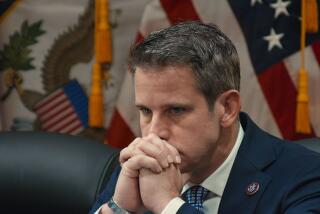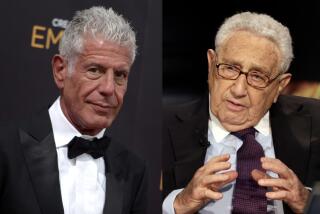COLUMN LEFT / GEORGE BLACK : Why Do They Think So Well of Henry? : Heâs arrogant, vengeful, paranoid, deceitful, duplicitous, vain--and frequently incorrect.
Cambodia is not one of the countries that Henry Kissinger knows best. Corporate clients donât seek out his advice on such places, and itâs been a long time--20 years next month--since he made his only visit to Phnom Penh. It lasted four hours. Shortly afterward, with a pause to sign the Paris peace accords, Kissinger caused a further 250,000 tons of bombs to be dropped on Cambodians from American B-52s.
Twenty years later, places like Cambodia still reap the whirlwind that Kissinger sowed. Yet the manâs public reputation has never stood higher. His advice bends ears in the nationâs top boardrooms, and the rest of us can rely on hearing those familiar wet-gravel tones on TV whenever international events require expert commentary.
This is odd in a way, because a new biography by Time magazineâs Walter Isaacson reinforces many of the damning characterizations that Kissinger has labored most mightily to overcome: that he is obnoxious, arrogant, vengeful, paranoid, deceitful, duplicitous, vain, a megalomaniac. None of these qualities, needless to say, has ever barred anyone from public office or media celebrity.
Polite society might also shun Kissinger, one would think, for the international company he has kept. It was Kissinger, the fan of Metternich and Bismarck, who encouraged the Chilean military to overthrow Salvador Allende, who gave the Argentine armed forces the wink to begin their âdirty war,â who encouraged the Indonesian generals to commence their slaughter in East Timor (holding back only until his plane had left Indonesian airspace).
The Iraqi Kurds have reason to remember this Kissinger, too. It was he who cut off their supply lines in 1975, long before George Bush ever thought of betraying them, to suit the Shah of Iran and the Baathist dictatorship in Iraq. After all, he explained at the time, âcovert action should not be confused with missionary work.â
Well, no one ever confused Henry Kissinger with a missionary. But denouncing him as a war criminal, as plenty of people have over the years, seems somehow passe these days. This is doubly true since the war in question--the Cold War--has now been won, and victors rarely pause to rake over the ethics of their past conduct.
For those who remain mesmerized by Kissingerâs public persona, the Isaacson book is only likely to cement the myth. (All the usual cliches are there: âLarger than life . . . global superstar . . . spellbinding mystique.â) On the darker sides of the man, it does not fundamentally alter the picture that earlier authors have painted. Those who invite Kissinger into their boardrooms, or book him for âNightline,â know all the stories by now. Yet somehow, none of its seems to matter; the mystique holds.
But those who are captive to the Kissinger mystique might pause to think about another, less publicized aspect of this record: how often he is simply proved wrong, woefully out of touch with the countries and events on which he is assumed to be an authority.
It was Kissinger who predicted that Mikhail Gorbachevâs reforms would leave the Soviet totalitarian state intact. On Eastern Europe, as late as December, 1988, he was proposing a âframework of accommodationâ with Moscow that would have left the Warsaw Pact intact. Kissinger has always been blinded by the fallacy that only superpowers, acting in secret, can make the wheels of history turn.
His defense of the Chinese leadership after the June, 1989, Beijing massacre has been widely deplored, and justly so. But equally damning is the fact that he was giving bullish investment advice to his corporate clients just six months earlier--when anyone with half an eye on China knew that it was heading for a momentous upheaval.
His commentary on the Gulf War was similarly clouded by his business interests. After all, the Banco Nazionale del Lavoro, which had been making illegal loans to the government of Saddam Hussein, was a client of Kissinger Associates. (Perhaps Kissingerâs sophistication about the Middle East can best be judged by his recent reported remark that âYou canât really believe anything an Arab says.â)
The question is why anyone should believe a word that Henry Kissinger says. Megalomaniac, fine. Influence peddler, sure. War criminal, so what. But the Kissinger mystique rests in the end on his claim to expertise--and that claim is largely paste and tinsel.
More to Read
Sign up for Essential California
The most important California stories and recommendations in your inbox every morning.
You may occasionally receive promotional content from the Los Angeles Times.










